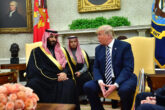February 03, 2021
Sharper: Iran
Analysis from CNAS experts on the most critical challenges for U.S. foreign policy.
While President Biden has publicly committed to reengaging Iran, his administration faces immediate challenges. From navigating Tehran’s demands to concerns from regional partners and members of Congress, America's path back to the 2015 Joint Comprehensive Plan of Action, or Iran deal, is anything but straightforward. CNAS experts are sharpening the conversation about the future of U.S. policy toward Iran under the Biden administration. Continue reading this edition of Sharper to explore their ideas and recommendations.
Reports
Reengaging Iran
In the course of seeking diplomatic engagement with Iran, the Biden administration will have to deal with a number of challenges, including: the technical complexities of Iran’s nuclear program; the ability to unwind and reimpose a complicated sanctions regime; the difficulties imposed by both Iranian and American domestic politics; and the interests and concerns of key international actors. To address these challenges, a CNAS report authored by Ilan Goldenberg, Elisa Catalano Ewers, and Kaleigh Thomas outlines a phased approach for engaging Iran in 2021 that takes into account economic, regional, and nuclear issues.
Strengthening the Economic Arsenal
Policymakers need a clear framework for how to use economic coercion that complements and works alongside existing frameworks for the use of military coercion. In a CNAS report, authors Elizabeth Rosenberg and Jordan Tama outline ways to improve how the United States uses sanctions, including by making U.S. sanctions-removal assurances more credible, rethinking the role of sanctions in pressure targeting adversaries, and emphasizing the importance of information-sharing and transparency around sanctions for effective foreign policy.
Countering Iran in the Gray Zone
Successive American presidents have been unable to find effective strategies to counter Iran’s use of surrogates and proxies across the Middle East, often hesitating to respond at all for fear of starting a larger conflict. A CNAS report examines Israel’s mabam campaign against Iran and Iranian-backed groups in Syria and draws eight lessons that the United States can apply to future actions in gray zone conflicts, both against Iran and more broadly.
Reengaging Iran
The international community may find Iran ready to consider a return to negotiations in 2021—regardless of the results in November....
Strengthening the Economic Arsenal
Foreword By David S. Cohen Sanctions occupy a strange place in U.S. national security. For many years, they were derided as mostly ineffective. The received wisdom was that sa...
Countering Iran in the Gray Zone
American freedom of action to strike Iranian targets in the gray zone may be greater than previously assessed, if U.S. policymakers are willing and able to replicate at least ...
Special Event
The Biden Administration and the Future of U.S.–Iran Relations
The Biden administration will enter office facing an array of decisions surrounding America's approach toward Iran, including on the future of the Iran nuclear deal and on Tehran’s regional activities. To discuss the future of U.S.–Iran relations in the Biden era, CNAS CEO Richard Fontaine hosted a conversation in December with experts Robert Malley, Ilan Goldenberg, Elisa Catalano Ewers, and Kaleigh Thomas.

Special Event: The Biden Administration and the Future of U.S.–Iran Relations
Dec 3, 2020
As the Trump administration’s “maximum pressure” campaign continues, the next 50 days will shape U.S.-Iran relations before the Biden team takes office. With tensions between ...
Read MoreCommentaries
On Iran, the Next Administration Must Break With the Past
"In order to relieve tensions, the next U.S. administration will need to engage Iran in renewed diplomacy," writes Elisa Catalano Ewers, Ilan Goldenberg and Kaleigh Thomas in Foreign Affairs. "But successful diplomacy with Iran will not come easily. The United States will have to navigate its own and Iranian domestic politics. Israel and some of the Gulf states will greet such engagement with anxiety or outright opposition. Moreover, a legacy of deep distrust divides Washington and Tehran."
Add Economic Policy to Deterrence Planning
"From Russia and North Korea to Iran and Venezuela, U.S. presidents and lawmakers have long employed varying levels of economic pressure to alter the policies of foreign governments," writes Elizabeth Rosenberg and Jordan Tama in Defense One. "Some of these tools – for instance, severing links between a country and the international financial system – can impose greater costs than some uses of military force. Yet policymakers have given too little thought to how different types of economic pressure intersect with different forms of military coercion."
On Iran, the Next Administration Must Break With the Past
The United States can address its discord with Iran and calibrate a smart and clear-eyed policy for the Middle East....
Add Economic Policy to Deterrence Planning
American defense leaders have adapted over the years to shifts in technology and conflict — for example, accepting space and cyber as principal warfighting domains and integra...
Sending Troops Back to the Middle East Won’t Stop Iran
Chris Dougherty and Kaleigh Thomas argue in Defense One: "Adding conventional forces to the region will not alter the calculus of an adversary whose strategy is to provoke and exhaust the United States and our allies and partners while avoiding all-out conflict. Even when surrounded by 150,000 to 200,000 U.S. troops in Afghanistan and Iraq between 2004 and 2011, Iran continued to pursue nuclear weapons and kill Americans in Iraq with explosively formed penetrators."
Sanctions by the Numbers: Spotlight on Iran
This edition of Sanctions by the Numbers written by Abigail Eineman explores Iran sanctions, tracking how designations and delistings have evolved over time, the dozens of countries affected by Iran-related sanctions programs, and the top types of U.S. designations. The data add to the existing consensus that sanctions have an inverse relationship with Iran’s economic health, and designations have far outpaced delistings in the last three years as part of the Trump administration’s “maximum pressure” campaign.
Demilitarizing U.S. Policy in the Middle East
Ilan Goldenberg and Kaleigh Thomas conclude in the Next Defense Strategy series, "A sustainable Middle East strategy that allows the United States to pull back militarily while focusing on realistic diplomacy and a smarter assistance strategy is a central building block for shifting resources to other priorities, for example effective competition with China."
Sending Troops Back to the Middle East Won’t Stop Iran
The Trump administration’s decision to kill Qassam Soleimani is the latest in an escalatory “maximum pressure” Iran strategy that is shifting American foreign policy attention...
Sanctions by the Numbers: Spotlight on Iran
This edition of Sanctions by the Numbers explores Iran sanctions, tracking how designations and delistings have evolved over time, the dozens of countries affected by Iran-rel...
Demilitarizing U.S. Policy in the Middle East
The next NDS must detail a new approach to the Middle East....
In the News
Featuring commentary and analysis by Ilan Goldenberg, Kaleigh Thomas, and Richard Fontaine.
Biden’s test: Rebuilding the Iran nuclear deal Trump tore apart
President-elect Joe Biden has made no secret that one of his earliest foreign policy objectives will be for the U.S. to rejoin the landmark Iran nuclear deal that the Trump ad...
Biden faces mounting hurdles on path to rejoin Iran deal
President-elect Joe Biden is facing mounting hurdles to reenter the Iran nuclear deal as the Trump administration uses its final days in office to try to cement its so-called ...
Pompeo, Who Led Trump’s Mission at State Dept., Leaves With a Dubious Legacy
Spurned by many foreign allies, ridiculed by adversaries, disliked by a significant number of his own diplomats and trying to preserve his political future, Secretary of State...
Thank you for registering! You will receive a confirmation email shortly. All CNAS events are free, open to the public, and viewable from cnas.org/live.
Stay up-to-date with report releases, events, major updates, and announcements from the Center for a New American Security.
More from CNAS
-
Game Over?
The trade wargame suggests that sustained high tariffs could create leverage and urgency to spur action toward a productive restructuring of the international trade system....
By Emily Kilcrease & Geoffrey Gertz
-
Middle East Security / Energy, Economics & Security
Trump Inks $600 Bn Deal In Saudi Arabia | Musk, Blackrock CEO Flank Trump In Gulf VisitIn today's episode of India Global, U.S. President Donald Trump secured a $600 billion commitment from Saudi Arabia on Tuesday to invest in the United States. NDTV's Gaurie Dw...
By Daniel Silverberg
-
Energy, Economics & Security / Technology & National Security
Tariffs and Tech: An Uncertain RecipeHigher tariffs could prompt American cloud companies to shift more of their capital investments abroad....
By Pablo Chavez
-
Trump Tariffs: How Will U.S. Plans Reshape the Global Economy?
Donald Trump says he's already decided the tariffs he will impose on countries that export goods to America, including the United Kingdom. Channel 4 hears from Emily Kilcrease...
By Emily Kilcrease














